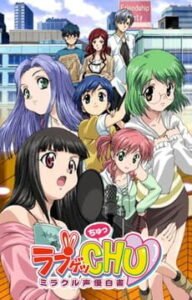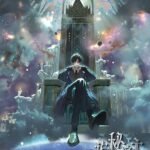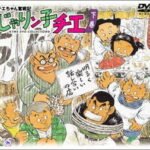Love Get Chu
ラブゲッCHU ~ミラクル声優白書~ / Love Get Chu - Miracle Seiyuu Hakusho / Rabugetsu Chu
| Genres: Comedy, Romance, Showbiz | |
| Themes: Showbiz | |
| Studios: Radix | |
| Rating: 6.49 / 10 | |
| Rank: #7277 | |
| Popularity: #7153 | |
| Users Listed: 9,289 | |
| Users Scored: 2,423 | |
| NSFW: No | |
| Last Updated: 03/03/2022 | |
| Aired: April 5, 2006 – September 27, 2006 (Spring) | |
| Type: tv | |
| Source: Visual Novel | |
| Age Rating: PG 13 | |
| Episodes: 25 |
Synopsis:
At a specialized training academy, five young women pursue careers as voice actresses, each driven by distinct aspirations. Momoko hopes to connect with her idol, Rinka explores the profession without a specific goal, Yurika is fueled by her passion for anime itself, Tsubasa navigates the complexities of romantic feelings while performing male roles, and Amane seeks a new path after facing setbacks in her acting endeavors. The series chronicles their journey through rigorous training and the challenges of breaking into the voice acting world, focusing on their collaborative efforts to hone their skills. Interwoven with these personal stories are glimpses into the anime production industry, alongside budding romantic relationships with a young man working within it. The narrative offers a realistic portrayal of ambition, self-discovery, and the dedication required to pursue creative dreams.
You May Also Like:
Characters:
- Ichihara, Momoko (Main) - Voice Actors: Takamoto, Megumi
- Maeda, Atari (Main) - Voice Actors: Takahashi, Naozumi
- Onodera, Tsubasa (Main) - Voice Actors: Sakamoto, Azuma
- Oohara, Amane (Main) - Voice Actors: Yamamoto, Maria
- Sasaki, Yurika (Main) - Voice Actors: Hase, Yurina
- Suzuki, Rinka (Main) - Voice Actors: Shintani, Ryouko
- Daimon, Eri (Supporting) - Voice Actors: Mitsuishi, Kotono
- Ichinose, Minato (Supporting) - Voice Actors: Midorikawa, Hikaru
- Narita, Runa (Supporting) - Voice Actors: Imai, Yuka
- Takemiya, Mitsuko (Supporting) - Voice Actors: Nozawa, Masako
Staff:
- Iwatani, Yoshinobu (Producer)
- Tougou, Mitsuhiro (Director)
- Tanaka, Hideyuki (Sound Director)
- Imazaki, Itsuki (Episode Director, Storyboard, Animation Director, Key Animation)
- Ishikura, Kenichi (Episode Director, Storyboard)
- Kanzaki, Yuuji (Episode Director)
- Katou, Tsurugi (Episode Director)
- Kobayashi, Takashi (Episode Director)
- Kosaka, Harume (Episode Director)
- Mikamo, Yoshito (Episode Director)
- Nakamura, Satomi (Episode Director)
- Nakayama, Atsushi (Episode Director, Director of Photography)
- Nishimura, Taiki (Episode Director)
- Okajima, Kunitoshi (Episode Director, Storyboard)
- Osamura, Shinji (Episode Director, Storyboard)
- Takahashi, Naruse (Episode Director, Storyboard, Character Design, Key Animation, Animation Director)
- Arakawa, Naruhisa (Script, Series Composition)
- Itou, Michiko (Script, Screenplay)
- Sunayama, Kurasumi (Script)
- Yamada, Yasunori (Script)
- Iimura, Masayuki (Storyboard)
- Takada, Jun (Storyboard)
- Uehara, Hideaki (Storyboard)
- Hase, Yurina (Theme Song Performance)
- Ide, Kouji (Theme Song Composition, Theme Song Lyrics)
- Kamata, Masato (Theme Song Arrangement)
- May'n (Theme Song Performance)
- Sakamoto, Azuma (Theme Song Performance)
- Shintani, Ryouko (Theme Song Performance)
- Takamoto, Megumi (Theme Song Performance)
- Yamamoto, Maria (Theme Song Performance)
- Abe, Nozomu (Key Animation)
- Baba, Ryuuichi (Animation Director, Key Animation)
- Fujiki, Yukari (Color Design)
- Furuta, Makoto (Key Animation)
- Gotou, Masahiro (Editing)
- Hagio, Keita (Key Animation)
- Huh, Seung Ki (Key Animation)
- Ichino, Maria (In-Between Animation)
- Ishibashi, Yukiko (Animation Director)
- Ishida, Keiichi (Animation Director)
- Katahira, Shinji (Art Director)
- Komatsubara, Sei (Key Animation)
- Mochizuki, Ken (Animation Director)
- Morimae, Kazuya (Animation Director)
- Motohashi, Hideyuki (Animation Director)
- Murata, Noriyasu (Key Animation)
- Nakahara, Ryuuta (Animation Director)
- Nakano, Hideaki (Key Animation)
- Noguchi, Takayuki (Animation Director)
- ... and 5 more staff
Reviews:
-
User kakyoism (Score: 9/10):
So far the only full-fledged story that deals with the life of Anime voice actors, or, Seiyuus (There is REC, but not as dedicated as this one). Despite the fact that the artwork of this series is of average quality, and that filler romance takes up too much time, it does present a lot of realistic aspects of the Anime voice acting industry. Highly recommended to Seiyuu fans yet do not expect super intelligent storyline other than how up-and-coming actors(actresses to be accurate) struggle through their green days. Story: 8/10Mixed with somewhat cliche comedy and romance, what's good about the nstoryline is that it faces the true problems of the industry such as commercializationnof voice acting and more emphasis on the look of the actors/actresses.nProfessionals have to move to front stage to cater to the enthusiasticnfans curious about other aspects of them that they don't necessarilynexcel at, e.g. singing. The experience of humiliating interview, thenheart-pressing training school days, and the embarrassing first-job,netc. all depict the hurting truth in this career: Here talented+diligent peoplentake pain with little gain other than small niche popularity. Yet as in mostnShounen works, the protagonists managed to find their own positionsneventually and started to take off with their childhood fantasy.nnComedy elements mostly center around the #1 protagonist Momoko, a nmindlessly ambitious girl that you saw a lot. Her ignorance of life stylenof Seiyuu conveniently serves as most audience's perspective; that givesnyou a bit of RPG flavor.nnThe romance (a love triangle) between two actresses and a young Animenart designer is kinda filler material and I understand that romance isna must for stories like this. Fortunately, the boy in love also provided enough ninspiration to our girls in focus.nnWith a luxurious 25 episodes, the story is at first pretty episodic, then when nthe romance sets in, it becomes a little draggy,nbut over the course a lot of character introspection enables us to realize nthe "3D" Seiyuu's fear and joy, often obscured by the happy shinny 2D charactersnthat they give life to. The ending is very creative in my opinion in that it tries to ndemonstrate the power of voice acting in a visual fantasy and surely was a lot of funnto me. Overall the story works for what it is.nnAn interesting setting: the agency that the protagonists work for isncalled Lamda 8, while in reality, some of the cast of the seriesnare signed to the famous agency called Sigma 7. So apparently ansemi-pun.nnArt: 6/10nYou will see typical Shounen style drawing but the number of colors usednare fairly limited. Good things is given that Seiyuus often work indoors, therenare a fairly elaborated outdoor settings as well. Character faces and body nfigures are nothing special. You still see the typical big eyes, slim body nfor example.nnSound: 8/10nWhat can I say? Given that this is about voice acting, you getnto hear quite a few top-notch actors doing what they do and theynreally mean themselves here! Most of the five female protagonists arennewbies but I really enjoyed 高本めぐみ(Takamoto Megumi)'s performance;nit was passionate,… -
User _Arcadia0 (Score: 8/10):
Love Get Chu ~ Miracle Seiyuu Hakusho ~ So this is the first all-out seiyuu anime that I have seen. Airing in 2006 in Japan only, I wasn’t entirely sure what I was getting into. I originally wanted to watch this because of the title Love Get Chu….. and the OP that I found. It was enough to make me go “Hmmm, yes this might be fun”. Love Get Chu is about a group of girls trying to become seiyuu (voice actors/actresses). It’s a very coming of age, slice of life, comedy type of anime. The girls that we’re introduced to are not experts; rather, wewatch them become seiyuu from the very beginning, training school. The girls themselves are pretty great, they’re all very different personality wise, but they’re also full of clichés, so if you hate that, this probably isn’t for you right off the bat. We have our super Main girl, the star of the show, the airhead who’s entirely naïve, the natural klutz and the one who is always ready to cheer everyone up; Momoko Ichihara. We also have the shy, quiet and reserved girl Rinka Suzuki, the tomboy Tsubasa Onodera, the observing intelligent girl Amane Oohara and the childhood friend Yurika Sasaki.nn There is also a male lead, the guy who is a part of a love triangle, the one who wants to become an animator, the filler; Atari Maeda. I call him filler because he’s honestly not needed for Love Get Chu. Most of the time he’s just sort of “there”. Sure there are episodes where he helps Momoko get to know herself better or where Momoko can rely on him sometimes, but by the end of the 25th episode, I was rather tired of seeing him. He’s the childhood friend to Yurika and the love triangle involved Yurika, Momoko and himself.nn The story in Love Get Chu is that of what I imagine other seiyuu like anime are, but since this is my first time watching one, I have no direct comparison. I think the biggest issue Love Get Chu has is identity. It starts off as a “we’re going to become seiyuu” and “we’re all rivals” sort of thing. Of course by episode 5, they all become seiyuu and the anime takes a turn for the hardships that are included to become one and the difficulty it is to be a really good seiyuu. It then goes into idol territory and tries to bring up some sort of antagonist; at least that’s what it looked like. I can’t even remember his name; I swear his name is only said like 10 times or something. There are these business and political aspects to Love Get Chu which just show up for seemingly no reason at all. If the entire anime had focused on either becoming a seiyuu, idol, or a combination of both, instead of shoehorning romantic elements and some fake antagonist, I’d give it an 8 or more.nn It’s a little funny, thinking… -
User jpmc (Score: 4/10):
I didn't expect to have to do a review, and since this show is fairly unknown, I think it wasn't necessary, but I needed to share my impressions with someone. I usually expect an anime with a rating of 6 to be either hidden treasure (Futakoi Alternative, Uta kata) or a great idea poorly executed but still retaining memorable features (Geneshaft, Divergence Eve). Love Get-Chu is the latter, but without the memorable aspect. Love Get Chu is the swan song of Radix studio, which like every studio, has at least one undeniable masterpiece that won't be forgotten as long as there are people watching anime:Haibane Renmei. But it's not a tuneful and worthy one, so it can't even be considered a swan song. In short, it is the story of a group of young girls wishing to become seiyuus. The story goes on well and interestingly in the first half, until episode 14. Then the love triangle involving the main character drags things out and when we finally get rid of it, the last episodes descend to the ridiculous in an insane championship to decide who will play the main role in the most awaited anime in history. If you're a fan of seiyuu and voice acting, the first half involving the slice of life and the whole career description will be pretty good, followed by a bearable ride to the end. If you're anyone else, the first half will be good or decent, and the rest unbearable or dragged out. Interestingly, Shirobako is a mirror image of what Love Get Chu could have been like if it had been performed well. The fact that it's the male lead who declares himself at the end and makes things happen is noteworthy. I suspect that if the show was better realised, perhaps the same story would only need 12 or 13 episodes, not 24 ( the last one is an extra).nnAfter that show, Haibane's studio went bankrupt and became Studio Seven, which produced other kinds of masterpieces, but it's still a sad ending and a terrible death.nnn------------nnEu não esperava ter de fazer uma review, e como esse show é bastante desconhecido, eu creio que não era necessário, mas eu precisava compartilhar minhas impressões com alguém. Eu geralmente espero que um anime com nota 6 seja ou tesouro escondido (Futakoi Alternative, Uta kata) ou uma grande idéia mal executada, mas que ainda guarda características memoráveis (Geneshaft, Divergence Eve). Love Get-Chu é o último, mas sem o aspecto memorável.nnLove Get Chu é o canto de cisne do estúdio Radix, que como todo estúdio, tem pelo menos uma inegável obra-prima que não será esquecida enquanto houver gente vendo anime: Haibane Renmei. Mas não é um canto afinado e digno, logo, nem um canto de cisne pode ser considerado. Em resume, é a estória de um grupo de moças desejosas de se tornarem seiyuus. A estória segue boa e interessante na primeira metade, até o episódio 14. Depois o triangulo amoroso envolvendo a protagonista torna…

























